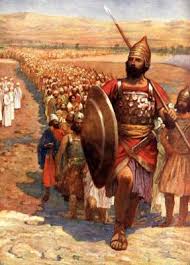Moshe Remembers Isra’el’s Conquest of the Transjordan
2:26 to 3:22
For thirty-eight years the Israelites wandered in the wilderness until entire Exodus generation, twenty years of age and older, had died. According to the midrash Eichah Rabbah, every year until fortieth year, on the eve of the Ninth of Av (see the commentary on The Life of Christ, to see link click Mt – The Destruction of Jerusalem and the Temple on Tisha B’Av in 70 AD), Moses would command the people, “Go out and dig,” and the people would leave the camp, dig graves and sleep in them overnight. The following morning a messenger would proclaim, “Let the living separate from the dead!” And fifteen thousand would die that night, but the survivors would return to the camp for another year.
This occured year after year, but in the thirty-eighth year no one died. Since they thought they might have miscalculated the days, they slept in their graves an additional night. This went on for five nights until the fifteenth of Av, when they saw the full moon, realized that their calculations were correct, and rejoiced that no more of the Exodus generation would die. They subsequently declared Tu B’Av (the fifteenth of Av) as a day of celebration. The “desert generation” had died off and the new generation was finally ready to enter the Promised Land. Then ADONAI instructed Moshe to go to war with the kings of the Transjordan.

Moses remembers the beginning of Isra’el’s conquest of the Land of Promise that had already taken place (see the commentary on Numbers). Jacob had acquired the land of Canaan by purchase and inheritance. Now Moses recalled how his descendents claimed their ancestral homeland. Sihon and Og, two kings of two kingdoms of the Transjordan, figure prominently because Sihon and Og (and their peoples) represented the firstfruits of the dispossession of the inhabitants of the entire region around Canaan. The victories over Sihon and Og served as a paradigm of Holy War in which God’s covenantal nation would utterly destroy His enemies (see Ag – The Problem of Holy War in the TaNaKh).74
After those victories, the Transjordan was regarded as Israelite territory. As a result, ADONAI gave the newly won territory to the tribes of Reuben, Gad, and half the tribe of Manasseh as their tribal inheritance. However, the entire Transjordan area, from the Wadi Arnon in the south to Mount Hermon in the north (Deuteronomy 4:48-49; Joshua 12:1), served as the base of operation for the tribes of Reuben, Gad, and half-tribe of Manassah, settling their wives, children and cattle there. The rest of the tribes set up camp across the Jordan River from Jericho. No matter where they settled, all of the tribes were preparing to cleanse the Land of idolatry in Ha’Shem’s Holy War.



Leave A Comment